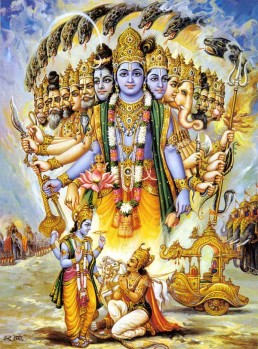Swami Chinmayananda
Swami Chinmayananda Commentary
The uncommon vision, “MARVELLOUS AND AWFUL,” experienced by Arjuna, was not a localised form on a six-footed Lord Krishna. It was, in fact, a manifestation, wide and varied, extending almost to the frontiers of the All-pervading. And yet, the Pandava Prince realised it all in his inward vision as a limited form, having a definite shape. In the intellectual understanding of all shapeless qualities (like freedom, love, nationality, etc.), one gives them each a substantiality, a form, well-defined and precisely outlined for one’s own intellect, although never for one’s own sense-organs. Similarly, Arjuna too feels that, the experience of the Universal-Form, though All-pervading, has for him a definite shape. But when he tries to define the Form-Universal, so well realised by him, his very expressions belie his own feelings and defeat his own purpose.
Arjuna finds that the entire world is terrified by the Great Grand Form representing in itself “MANY MOUTHS AND EYES, MANY ARMS AND THIGHS, WITH MANY STOMACHS, AND FEARSOME WITH MANY TUSKS.” He also adds, “SO AM I.” Psychologically, when an individual is in a crowd of excited people or in the company of good men of peaceful contemplation, he vicariously gathers unto himself the mental qualities of the crowd in which he finds himself. “THE WORLD IS TERRIFIED,” and, Arjuna confesses, “I TOO AM.” At the same time, the Pandava Prince feels it insulting and cowardly for his royal heart to feel any fear. Therefore, justifying his own fear, he describes the Terrible-Form to be in fact formless, and says that it absorbs into itself everything. The Universal-Form touches the very skies above. It glows with a variety of colours. Its fiery-eyes glow. Its open mouths consume everything. Altogether, the vision is capable of unnerving even the gods. Seeing that ‘Vision’ Arjuna confesses, “MY HEART QUAKES, AND I LOSE MY COURAGE AND MY PEACE.” It is very significant that it is in this condition of benumbing fear that the great hero addresses the cosmic-vision, “O, Vishnu.”*
As I said in the beginning, the conception-form so clearly defined in the intuitive understanding of Arjuna, is in fact the Infinite described in terms of Its own endless manifestations as the names and forms in the Universe. We, the students of the Geeta, should never forget these subtle under-currents of thought that Vyasa has so secretly kept for the profit of all diligent and sincere seekers of Truth.
ELABORATING HIS OWN SELF-EXPLANATIONS ON WHY HEROIC HEARTS SHOULD TREMBLE IN FEAR, THE PANDAVA PRINCE CONTINUES:
Adi Sankara Commentary
O Visnu, hi, verily; drstva, seeing; tvam, You; nabhah-sprsam, touching heaven; diptam, blazing; aneka-varnam, with many colours, (i.e.) possessed of many frightening forms; vyatta-ananam, open-mouthed; dipta-visala-netram, with firey large eyes; I, pravyathita-antara-atma, becoming terrified in my mind; na vindami, do not find; dhrtim, steadiness; ca, and; samam, peace, calmness of mind. Why?
The Bhagavad Gita with the commentary of Sri Sankaracharya – Translated by Alladi Mahadeva Sastry
Holy Geeta – Commentary by Swami Chinmayananda
The Bhagavad Gita by Eknath Easwaran – Best selling translation of the Bhagavad Gita
The Bhagavad Gita – Translation and Commentary by Swami Sivananda
Bhagavad Gita – Translation and Commentary by Bhaktivedanta Swami Prabupadha
Srimad Bhagavad Gita Chapter 11 – Verse 24 – 11.24 nabhahsprsam diptamaneka – All Bhagavad Gita (Geeta) Verses in Sanskrit, English, Transliteration, Word Meaning, Translation, Audio, Shankara Bhashya, Adi Sankaracharya Commentary and Links to Videos by Swami Chinmayananda and others – 11-24

